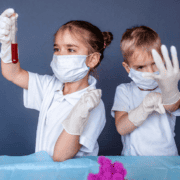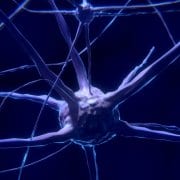An Overview of Allergy Induced Autism
Allergy Induced Autism (AIA) is a support and research network in the United Kingdom. The purpose of the AIA is to encourage medical research into autism. We are pleased to report that some very exciting research is taking place. As our network’s name implies, our main focus is on the role of allergy in autism. My personal story was the impetus for this project.
Several years ago, a pediatric consultant told me that my son, Ali, was one of about thirty children he had seen who appeared suddenly to have slipped into autism for no apparent reason. There were common factors in this group: all came from “allergic” families, had allergic reactions themselves, had high levels of the brain transmitter serotonin, and changed hand dominance at the onset of autism. They also appeared to be normal for about the first eighteen months of life, with no sign of early infantile autism. Unfortunately, this consultant died the week after we saw him, and the research stopped. I then began to study this condition myself, and that is how AIA was started.
I later contacted Dr. Rosemary Waring, who leads a research project at Birmingham University School of Biochemistry. I asked if she could test for excretion of a substance called sulphate, which help detoxify harmful substances in the body. Through my own research I had begun to suspect that this could be a problem for these children. Dr. Waring tested Ali, who was found to have very little of this substance. We have now tested forty autistic individuals, and all but two have the same problem. A lack of sulphate means that one is unable to rid the body of natural toxins that occur in foods and chemicals.
We recently received a grant from Action Research, which has enabled us to continue with the testing and design additional test protocols. It appears that this group of youngsters with autism benefits from dietary intervention. The foods that have caused the most problems are wheat, cow’s milk, citrus, chocolate, cheese, and tomatoes. These foods are also implicated in migraine, and most of our mothers suffer from this. The enzyme that sulphate is used on, phenolsulphotransferase-P, has been found to be low in our children and in migraine patients, while sulphate itself is low in many who suffer from allergy.
Profiles on our children also indicate physical problems not typically associated with autism: excessive sweating, diarrhea, rhinitis, eczema, asthma, and intolerance to many foods and chemicals.
The AIA does not suggest that sensitivity to foods is the cause of autism, but it does appear that certain components of foods exacerbate some symptoms of autism. We invite families and professionals to share their experiences with us as we continue our research efforts in this critical area.
Alistair’s story
Alistair is ten years old. He looks perfectly normal, but he has autism. He has no speech and cannot communicate, except by gesture; he understand only simple commands. Ali has no friends. Although he is a happy child in his own way, he is difficult to manage. He has to be watched constantly, as he can easily get into dangerous situations. He can also be demanding, wanting things done for him right away We love Ali dearly, but it has been very sad for us all. He has never called me “Mum,” and I don’t know if he ever will.
One thing I find hard to comprehend is that we had a perfectly normal, healthy baby and toddler until he was about two years old. Suddenly, things changed. Ali went from being like his brother and sister at this age — playing and developing normally and speaking — to being hyperactive and eventually receiving the diagnosis “severely learning disabled with autistic tendencies.”
At the same time that this change was taking place, Ali changed his eating habits. Previously, he had a good appetite and ate most anything. With the change, he wanted only certain foods, and refused others. He started to become much more hyperactive at night after eating particular foods, and rarely slept. We were advised by the Hyperactive Children’s Support Group (UK) to change his diet and see if it helped. This has made a tremendous difference.
He cannot tolerate certain foods, and by avoiding them he has better concentration, uses more eye contact, is less hyperactive, and sleeps much better. We make sure that foods he is sensitive to are not available to him. At first he refused substitutes, but eventually he began to eat them. Ali still has many problems. Diet control is not a cure, but it helps a great deal.
See this link for publications by the author.









